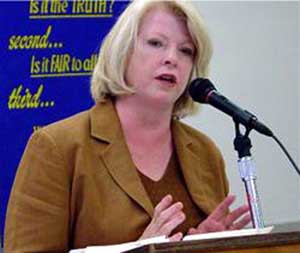-
- FMA fails in the House
- SLDN announces new legal challenge to ‘Don’t Ask, Don’t Tell’
- GLBTs more at ease in workplace
- The science of sex and God – it’s in the genes
- Conservative Mass. House picks social liberal before same-sex marriage fight
- Attorney general: Marriage amendment would harm economy
- National News Briefs
- World News Briefs
national
FMA fails in the House
Musgrave proposal gets majority support, falls short of two-thirds majority
Published Thursday, 07-Oct-2004 in issue 876
WASHINGTON (AP) – The House has followed the Senate in decisively rejecting a constitutional amendment banning same-sex marriage, ending debate – for this year – on what has become the dominant issue for the Republican Party’s conservative base.
The 227-186 vote in the House fell well short of the two-thirds majority needed to advance a constitutional amendment, but fulfilled a promise by backers to get lawmakers on the record on the highly sensitive issue in the run-up to Election Day.
“Traditional marriage is worth preserving, because the nuclear family is far and away the best environment in which to raise children,” said Rep. Marilyn Musgrave, R-Colo., who sponsored the proposal along with Sen. Wayne Allard, R-Colo. “Every child deserves both a father and a mother,” she said.
Musgrave, a first-term lawmaker running for reelection in November, has gained unusual national attention because of her persistent advocacy for the measure. But critics in her own district in Colorado, which sweeps from fast-growing cities in the north to farms and ranches in the east and south, have said she is not representing the people, calling her a “one-trick pony” with a “narrowly focused and personal agenda.”
Despite Musgrave’s defeat on the proposal this year, House Majority Leader Tom DeLay indicated it wouldn’t be the last time the issue was discussed.
“This is only the beginning, I’m telling you,” said DeLay, R-Texas, stressing that the issue was too important to abandon.
“Marriage is the basic unit of society, the very DNA of civilization, and if that civilization is to endure, marriage must be protected,” he said.
Democratic opponents said the motives for holding the vote were tinged more with election-year politics than protecting the nation from same-sex marriages.
“The purpose in bringing this amendment to the floor today, just four weeks before the election, is to create the fodder for a demagogic political ad that appeals to voters’ worst fears and prejudices,” said Rep. Steny Hoyer of Maryland, the House’s second-ranked Democrat.
The measure drew the support of 191 Republicans and 36 Democrats. Voting against it were 158 Democrats, 27 Republicans and one independent.
The Constitution has been amended only 27 times, including the 10 amendments in the Bill of Rights, in its history. Amendments must win two-thirds majorities in the House and Senate and be ratified by three-fourths of state legislatures. The Senate rejected the same-sex marriage amendment in July.
The House in recent days has also taken up legislation dealing with gun rights and the phrase “under God” in the pledge, two other issues of importance to social conservatives.
The chamber voted 250-171 to overturn a 28-year municipal ban on handgun ownership in the District of Columbia. It also voted to protect the “under God” phrase from federal court challenges. Both bills are unlikely to be considered in the Senate before this session of Congress concludes.
President Bush had urged Congress to take up the same-sex marriage amendment. Recent surveys in battleground states in the presidential race indicate roughly one-quarter of Bush’s supporters say moral or family values are uppermost in their minds.
The same-sex marriage amendment said marriage in the United States “shall consist only of a man and a woman.” It also would have required that neither the U.S. Constitution nor any state constitution “shall be construed to require that marriage or the legal incidents thereof be conferred upon any union other than the union of a man and a woman.”
DeLay said the need for congressional action was “forced upon us by activist judges trying to legislate from the bench.” He noted that under 1996 legislation passed by Congress and signed by President Clinton, marriage is defined as between a man of a woman.
Rep. Jim McGovern, D-Mass., said it has long been the tradition that states, not the federal government, regulate marriage and other family law issues. States are already addressing same-sex marriage issues with numerous referendums and legislative action, he said.
Voters in 11 states will decide the fate of proposed amendments to their state constitutions this fall, and opponents of bans on same-sex marriage concede they will be difficult to stop.
McGovern noted that in his own state, where the state supreme court decided in favor of same-sex marriage last year, a process was now under way to give voters a chance to change the state constitution to ban same-sex marriages.
“We feel love and we feel it in a way different than you,” said Rep. Barney Frank, a Massachusetts Democrat who is openly gay. “We feel it with someone of the same sex, male or female, and we look at your institution of marriage and we see the joy it brings. How do we hurt you when we share it?”
Public polls show strong opposition to same-sex marriage, but opinion is about evenly divided regarding a federal constitutional amendment to ban it.
|
|
Copyright © 2003-2025 Uptown Publications


